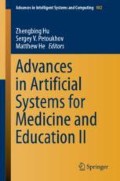Abstract
The analysis of spatial relations and the search for abstract structures are some of the main tasks of geoinformatics. Huge arrays of spatial information contain hidden abstract structures. Existing methods of clustering do not take into account topological features of spatial objects. It is necessary to create new algorithms for finding regularities in the set of objects on the map. Algorithms for selecting abstract spatial structures based on topological data analysis are developed in the article. The developed algorithms allow us to find common structures in a set of unrelated spatial data. The algorithms for collecting spatial information from point and polygonal objects are also developed in the article. These algorithms allow us to present the initial information for processing by methods of persistent homology. An algorithm for constructing a barcode using simplicial complexes is shown. The study includes topological analysis of point and contour objects. An original approach for searching for repeating structures in a set of randomly distributed spatial objects is shown. Information about the repeating structures is calculated from the barcode. Computer modeling to analyze the structure of a sequence of objects with deformation is demonstrated. Examples for determining the similarity of natural spatial objects based on information from the barcode are given.
Access this chapter
Tax calculation will be finalised at checkout
Purchases are for personal use only
References
Eremeev, S.V., Andrianov, D.E., Komkov, V.A.: Comparison of urban areas based on database of topological relationships in geoinformational systems. Pattern Recogn. Image Anal. 25(2), 314–320 (2015)
Eremeev, S.V., Kuptsov, K.V.: Spatial objects classification algorithm on the basis of topological features of a form. In: Proceedings of the 2nd Russian-Pacific Conference on Computer Technology and Applications, pp. 44–48. IEEE, Vladivostok, Russia (2017)
Eremeev, S.V., Kuptsov, K.V., Seltsova, E.A.: Algorithm for selecting homogeneous regions from a set of spatial objects. In: XX IEEE International Conference on Soft Computing and Measurements (SCM 2017), pp. 109–113. IEEE, Saint-Petersburg, Russia (2017)
Saidala, R.K., Devarakonda, N.: Multi-swarm whale optimization algorithm for data clustering problems using multiple cooperative strategies. Int. J. Intell. Syst. Appl. (IJISA) 10(8), 36–53 (2018). https://doi.org/10.5815/ijisa.2018.08.04
Anuradha, J., Tripathy, B.K.: Hierarchical clustering algorithm based on attribute dependency for attention deficit hyperactive disorder. Int. J. Intell. Syst. Appl. (IJISA) 6(6), 37–45 (2014). https://doi.org/10.5815/ijisa.2014.06.04
Hu, Z., Bodyanskiy, Y.V., Tyshchenko, O.K., Samitova, V.O.: Fuzzy clustering data given in the ordinal scale. Int. J. Intell. Syst. Appl. (IJISA) 9(1), 67–74 (2017). https://doi.org/10.5815/ijisa.2017.01.07
Hu, Z., Bodyanskiy, Y.V., Tyshchenko, O.K., Tkachov, V.M.: Fuzzy clustering data arrays with omitted observations. Int. J. Intell. Syst. Appl. (IJISA) 9(6), 24–32 (2017). https://doi.org/10.5815/ijisa.2017.06.03
Al-Hasan, M., Salem, S., Zaki, M.J.: SimClus: an effective algorithm for clustering with a lower bound on similarity. Knowl. Inf. Syst. 28(3), 665–685 (2011)
Pham, D.T., Dimov, S.S., Nguyen, C.D.: A two-phase K-means algorithm for large datasets. Mech. Eng. Sci. J. 218(10), 1269–1273 (2004)
De Almeida, J., Morley, J., Dowman, I.: A graph theory in higher order topological analysis of urban scenes. Comput. Environ. Urban Syst. 31(4), 426–440 (2007)
Edelsbrunner, H., Harer, J.: Computational Topology: An Introduction. American Mathematical Society (2009)
Carlsson, G.: Topology and data. Bull. Am. Math. Soc. 46, 255–308 (2009)
Kelin, X., Zhixiong, Z.: Multiresolution persistent homology for excessively large biomolecular datasets. J. Chem. Phys. 143, 5–13 (2015)
Kurlin, V.: A one-dimensional homologically persistent skeleton of an unstructured point cloud in any metric space. Comput. Graph. Forum 34(5), 253–262 (2015)
Kalisnik, S.: Tropical coordinates on the space of persistence barcodes. Max Planck Inst. Math. Sci. 3, 12–28 (2017)
Acknowledgements
The reported study was funded by RFBR and Vladimir region according to the research project no. 17-47-330387.
Author information
Authors and Affiliations
Corresponding author
Editor information
Editors and Affiliations
Rights and permissions
Copyright information
© 2020 Springer Nature Switzerland AG
About this paper
Cite this paper
Eremeev, S., Seltsova, E. (2020). Algorithms for Topological Analysis of Spatial Data. In: Hu, Z., Petoukhov, S., He, M. (eds) Advances in Artificial Systems for Medicine and Education II. AIMEE2018 2018. Advances in Intelligent Systems and Computing, vol 902. Springer, Cham. https://doi.org/10.1007/978-3-030-12082-5_8
Download citation
DOI: https://doi.org/10.1007/978-3-030-12082-5_8
Published:
Publisher Name: Springer, Cham
Print ISBN: 978-3-030-12081-8
Online ISBN: 978-3-030-12082-5
eBook Packages: Intelligent Technologies and RoboticsIntelligent Technologies and Robotics (R0)

